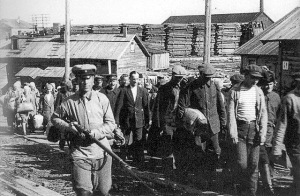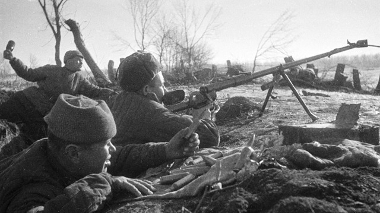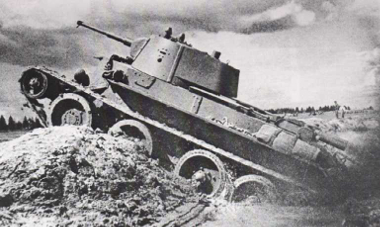
Bellow is the reproduction of a text first published on my blog Crappy Town. It tries to establish the number of Soviet citizens that died as a result of repression by the Soviet state between July 1941 and May 1945 when the USSR was at war with Germany during the Second World War. It is part of my emerging working paper that tries to break down the 25 million losses of the Soviet Union in the Soviet-German War between its different causes.
Wartime Deaths Due to Soviet Repression
The Soviet Union under Stalin was a highly repressive state that engaged in repression of its citizens on a vast scale. Its repression was deadly and resulted in numerous deaths, even when the state had not explicitly set out to make repression lethal and to cause the death of those repressed. What is more, the four years of the Great Patriotic War were characterized by a sharp increase in the scale repression and the occurrence of deaths due to repression relative to most peacetime years under Stalin, including the immediate pre-war time.
The Gulag
Archival data shows the gulag administration in the years 1941 through 1945 presided over the deaths of 1.02 million inmates of whom 622 thousand prisoners in labor camps of the gulag, 312 thousand in labor colonies of the gulag and 85 thousand in prisons. The total number of deaths the gulag was responsible for in this time frame may be even higher on the account of deaths among former inmates who died after their release but as a consequence of the conditions they had been subjected to during their imprisonment.[19]
During the war mortality among the inmates of the gulag increased sharply so that one half of those who perished in the gulag did so in the war years, particularly between 1941 and 1943 and mainly of malnutrition related causes. German invasion of the USSR caused food shortages everywhere in the Soviet Union, however, malnutrition and the consequent mortality in the gulag was much more severe than among free Soviet citizens in the unoccupied USSR.
The most proximate cause of the crisis for the inmates of the gulag was that they were being kept imprisoned, mostly unjustly, with little aces to food, not that the Germans had invaded the Soviet Union and caused a general shortage of food. Had the regime released the inmates it was unable to feed they would have stood a far better chance of surviving than they did in the camps. This would have only benefited the war effort as a gulag inmate was only half as productive as a free laborer.
Internal Exile and the Labor Army
Another major category of Soviet citizens who suffered lethal repression at the hands of the Soviet regime during the war were deportees in internal exile. Deportees were usually stripped of their civic freedoms, lost most of their property and were often dumped in some of the most inhospitable parts of the Soviet Union, condemned to live in “special settlements” they would often first yet have to build. Besides working in the exile colonies themselves they were lent out to industries as unfree labor, or, during the war, could find themselves conscripted into the Labor Army. The exile groups experienced a far higher rate of mortality compared to the rest of the Soviet population, particularly in the first several years of their exile, after which their circumstances usually gradually improved.
Under Stalin the Soviet Union internally exiled just over 6 million people of whom 2 million during the war itself, 383 thousand immediately preceding the war in 1940-41, as well as 700 thousand in the second half of the 1930s. Russian demographer D.M. Ediev estimates that until 1952 between 700 thousand and 1 million people had died as a consequence of deportations, however, the question here is how many of these perished during the four years of the war itself.[20]
Ediev calculates the total excess mortality among the 1383 thousand exiled Soviet Germans and Finns who were mainly deported 1941 was 248 thousand. Similarly the excess mortality among the 1025 thousand deported Karachais, Kalmyks, Chechens, Ingushetians, Balkars, Crimean Tatars and Meshketian Turks who were deported in 1943 and 1944 was 226 thousand. Nearly three quarters of the 380 thousand who were exiled in 1940 and first half of 1941 were former Polish citizens, who were therefore subject to an amnesty of August 17th 1941 and June 30th 1943.[21] Since their banishment was much shorter their losses would have been considerably smaller than those of the the Soviet Germans and Finns who were deported in the second half of 1941. Combined, until 1952 the exile groups deported from 1940 to 1944 may have experienced about 500 thousand excess deaths.
Given that deportees were most likely to die in the first few years of their exile it is probable just under half of these 500,000 deaths occurred during the war itself. Along with the excess losses of the more “settled” exiles deported in the 1930s the total figure of wartime deaths among exile groups in special settlements and the Labor Army may be around 300 thousand.
Executions
It is well documented that 1941 through 1945 civilian courts in the USSR sentenced to death 22,572 people for criminal offenses and 42,149 people for political offenses.[22] Additionally, as has been discussed in section 2, during the war some 135 thousand Red Army soldiers may have been executed after a court martial.
Furthermore during the initial stage of the war the NKVD carried out prison massacres against inmates of Soviet prisons in the western USSR. Due to the speed of the initial German advance across USSR territory and the existing demands on the Soviet transportation system the Soviet authorities found it impossible to evacuate the prisons lying in the path of the Germans in time. Rather than leave them to the enemy the center ordered local NKVD guards to evacuate only some categories of prisoners, release others and execute still others.
Consequentially the NKVD massacred about 8,789 inmates in prisons in Ukraine and 530 in Belarus, an additional 940 prisoners during the evacuations from these prisons, and an unknown number in the prisons in Baltic republics.[23] The number executed in such circumstances is therefore not fully certain, however, the losses among the prisoner population that were sustained in this way are counted in the 85 thousand wartime losses among the prison population anyway.
Altogether, in the course of the war about 210 thousand Soviet citizens were outright executed or massacred by the Soviet security apparatus.
Summary
Altogether during the Soviet-German war of 1941-45 there were around 1.5 million deaths of Soviet citizens due to repression of the Soviet authorities. 1 million deaths among the captive population in the gulag and the prisons, 200 thousand condemned to death and executed of whom 65 thousand civilians and 135 thousand military, as well as roughly 300 thousand internal exiles who perished during the war as a consequence of deportations and conscription into the labor army.
19. Michael Haynes and Rumy Hasan, A Century of State Murder? Death and Policy in Twentieth-Century Russia (London: Pluto Press, 2003) 214-215.
20. For the size, time and composition of individual deportation operations see Pavel Polian, Against Their Will: The History and Geography of Forced Migrations in the USSR (Budapest: Central European University Press, 2004) 327-333. For the figures on mortality see Dalkhat Ediev, Demograficheskie Poteri Deportirovannyh Narodov SSSR (Stavropol’: StGAU “AGRUS”, 2003) 302-303.
21. Polian, 2004, 119.
22. Stephen Wheatcroft “Victims of Stalinism and the Soviet Secret Police: The Comparability and Reliability of the Archival Data — Not the Last Word”. Europe-Asia Studies Vol. 51, No. 2 (1999): 337-338.
23. Aleksandr Gur’yanov and Aleksandr Kokurin “Èvakuacija tjurem. 1941”. Rossijskij istoricheskij zhurnal “Karta” No.6 (1994): 16-27.






